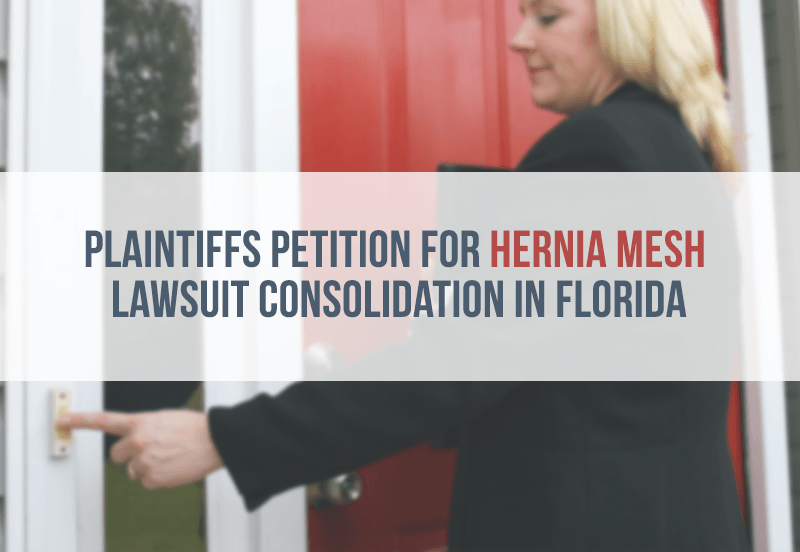
Plaintiffs who say Ethicon’s Physiomesh Composite hernia mesh left them with serious injuries petitioned the court to consolidate lawsuits in Florida.
On March 9, 2017, plaintiffs filed a Motion for Transfer for 18 hernia mesh lawsuits filed in nine separate courts across the country: Florida, Illinois, Georgia, Colorado, South Carolina, Kentucky, Massachusetts, Oklahoma and New Jersey.
Doctors use Ethicon’s Physiomesh Composite mesh to repair hernias, areas of weak muscle in the abdomen. Injuries mentioned in lawsuits include infections, organ damage, autoimmune problems, adhesions (scar tissue) and bowel obstruction that require additional surgery.
The motion petitions the court to consolidate cases in multidistrict litigation (MDL). In the MDL process, the court groups cases with similar damages and allegations together under one federal judge to speed up litigation.
“All of the plaintiffs in the constituent cases claim that the devices implanted in their bodies were defectively designed and/or manufactured, and that the defendants failed to provide appropriate warnings and instructions regarding the dangers posed by these devices,” according to the motion.
Ethicon sold about 330,000 Physiomesh hernia mesh implants worldwide. It sold about 50 percent of those products in the U.S., according to plaintiffs. Ethicon voluntarily pulled the mesh from the market in May 2016 after it found higher rates of reoperation and hernia recurrence.
Cases May be Consolidated in Florida or Illinois
The first choice for consolidation is the Middle District of Florida, where the most cases are currently pending. The Middle District of Florida also has the resources and is able to resolve cases quickly.
Florida judge Hon. Paul G. Byron is already handling one of the first hernia mesh lawsuits. He would be “well-suited to handle this litigation,” plaintiffs said.
Plaintiffs also recommended Judges James D. Whittemore and Susan C. Bucklew.
The second choice for consolidation is the Southern District of Illinois under Judge David R. Herndon who is presiding over two MDLs: Yasmin and Yaz (MDL 2100) and Pradaxa (MDL 2385).
Lawyers Compare Hernia Mesh to Pelvic Mesh
Lawyers compared hernia mesh cases to transvaginal mesh lawsuits already consolidated in multiple MDLs under Judge Joseph R. Goodwin in West Virginia.
Hernia mesh is made of the same polypropylene plastic. As of March 15, 2017, there are more than 60,000 claims pending against six transvaginal mesh manufacturers. At one time, there were close to 100,000.
Plaintiffs in hernia mesh litigation suffer similar complications as transvaginal mesh victims.
“The plaintiffs herein suffered serious and often permanent physical injuries from the implantation of the Physiomesh, often requiring additional surgeries, additional medical expenses, and unresolved medical complications,” hernia mesh plaintiffs wrote in court documents.
Ethicon is not the only company facing hernia mesh lawsuits. C.R. Bard’s subsidiary Bard Davol faces litigation for its Kugel Hernia Patch. Maquet Getinge Group’s subsidiary Atrium Medical Corp. faces lawsuits over its C-QUR line of surgical mesh.